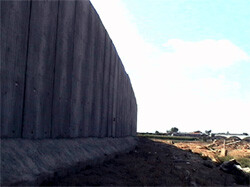Palestine Center 21 July 2003
Israel’s Apartheid Wall: The final act in pre-empting an independent and viable Palestinian state
The following text is based on remarks delivered by Stephanie Khoury and Fuad Hallak from the PLO’s Negotiations Affairs Department, at a meeting at the Palestine Center in Washington DC on 18 July 2003. The speakers’ views do not necessarily reflect those of the Palestine Center or The Jerusalem Fund.

The Wall near Qalqilya in 2003. (Arjan El Fassed)
Speaking at a 18 July 2003 Palestine Center briefing, Khoury and Hallak explained that Israel’s Separation Wall will enclose and isolate the Palestinians in cantons and enclaves on 45 percent of the West Bank. The Wall will physically and functionally sever the northern and southern West Bank.
In total, the Wall is projected to include all of the Jewish colonies-with the exception of approximately 15-some 98 percent of all settlers and 440,000 Palestinians. Approximately half of the Palestinians caged in by the Wall do not have Israeli residency, and 30 percent of them will be in double fenced areas. Khoury and Hallak stated that these Palestinians are in an extremely tenuous and vulnerable situation, they are deprived of their livelihood and access to necessary social services such as health and education. The remaining 1.56 million Palestinians in the West Bank will be enclosed by the fence in large cantons.
Hallak explained that the Wall is “permanently prejudicing prospects for a modern, self-sustaining Palestinian economy.” He added that east Jerusalem, the future capital and economic center of the Palestinian state, is already severely limited by the Wall. Areas of high agricultural productivity will be “incapacitated” because they will fall on the Israeli side of the Wall. Furthermore, key industrial and commercial areas such as Qalqilya and Tulkarem that serve as regional hubs in the West Bank will be isolated or marginalized.
According to Hallak, Qalqilya has been deprived of approximately 15 percent of its prime agricultural land. The town of 45,000 residents has an 80 percent unemployment rate. The denial of access to health and educational services has caused 8,000 Qalqilians to leave.

Route of the first stage of Israel’s apartheid wall and the enclaves in the Qalqiliya area (Map: B’Tselem, 2003)
Khoury and Hallak explained that Israel’s full implementation of its colonial designs-which entails vast confiscation of Palestinian lands and water resources as well as the disruption of territorial contiguity-would leave the Palestinians with a “state” only in name.
“The Wall and settlement expansion are destroying President Bush’s vision of an independent Palestinian state,” Khoury said. Khoury pointed out that the Wall and settlements undermine the ability of the Palestinian Authority (PA) to effectively fulfill its obligations on the road to state-building, key among them is security. She stressed that the Wall is creating wide-spread poverty and despair among Palestinians. These conditions, Khoury warned, foster further instability and violence.
Related Links: